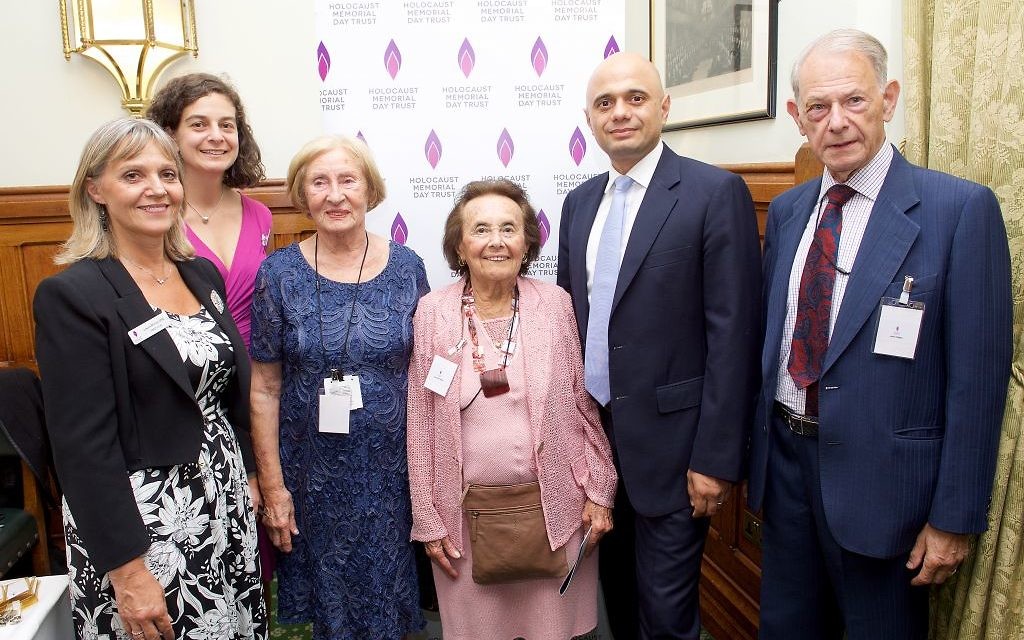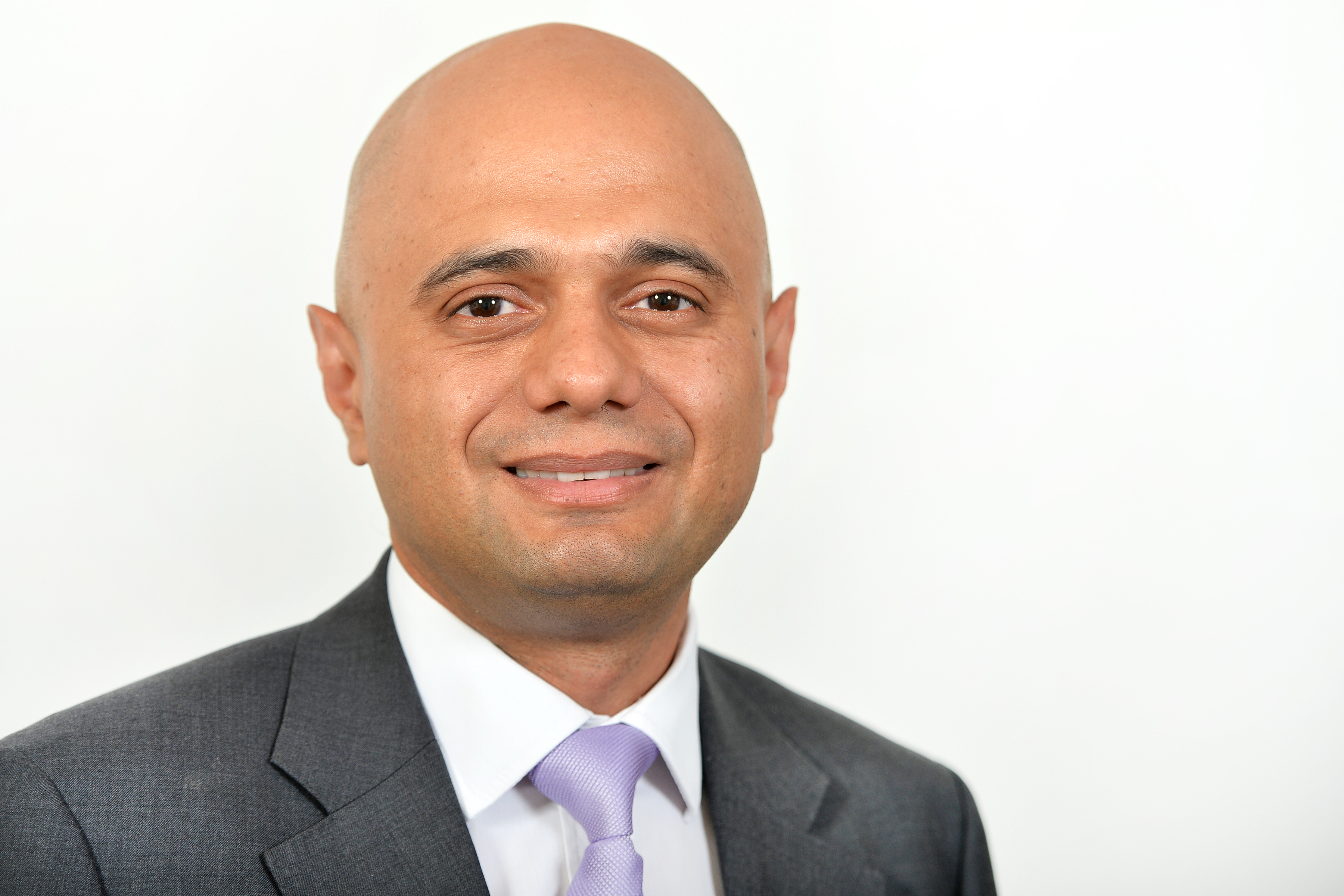Sajid Javid: ‘Hate crime is committed by people like you and me’
Communities Secretary Sajid Javid speaks at a Holocaust Educational Trust event about the need to tackle anti-Semitism and racism at the launch of the English translation of Dr Bornstein’s Holocaust memoirs

As an MP and minister, I’ve been privileged to hear the testimony of those who lived through the Holocaust.
Thanks to the Holocaust Educational Trust, 100,000 young people a year can say the same. And, thanks to the government-backed Lessons From Auschwitz project, thousands of schoolchildren and teachers are able to visit the most notorious of death camps every year. I accompanied a group in 2011, and it was one of the most emotional, moving experiences I’ve had.
But it’s now more than 70 years since the camps were liberated and it’s never been more important to listen to and learn from the survivors of the Third Reich.
Get The Jewish News Daily Edition by email and never miss our top stories Free Sign Up
And it’s also why I’m so pleased to see the new, English edition of The Long Night, Ernst Israel Bornstein’s incredible story. It’s an amazing piece of writing but it also contains lessons for us all to reflect on.
The first is the way the full horror of the Holocaust unfolds only slowly. The first time Bornstein encounters Nazi soldiers, they’re chatting to civilians and handing chocolates to children. The first labour camp is relatively humane. But as the book goes on, the situation grows gradually worse. Conditions deteriorate. Brutality increases. Death – initially a rare occurrence provoking great shock – becomes routine. And, almost before you know it, you’re reading this horrific, vivid, deeply disturbing account of the death marches.
It’s a reminder that the Holocaust did not begin in the gas chambers. It began when hatred and bigotry were allowed to grow without challenge.

Last year, the Community Security Trust reported an alarming increase in anti-Semitic incidents. In the summer, there was a worrying spike in levels of hate crime more generally. It’s easy to to call it just a few isolated cases. But the Holocaust shows the danger of normalising bigotry. It’s not enough to simply tell ourselves that
we disapprove. We have to take action.
Which brings me to my second lesson. We often look at the Holocaust through the stories of survivors and victims. This book reminds us that the perpetrators are often dismissed as some vast, faceless machine, which diminishes their individual guilt.
And that’s not something Bornstein allows. He paints a vivid picture of named kapos and “block elders”. Of specific SS men and camp guards, each with their own character, their own face, their own story.
Then there are the bystanders. Passengers on comfortable trains who turn their faces away. The farmer who refuses to offer sanctuary, or even a scrap of food, to fleeing prisoners. And the crowds of worshippers who file out of church and ignore the column of human misery marching past.
The Shoah wouldn’t have happened were it not for the actions of a relatively few evil individuals. But it could not have happened without millions of ordinary men and women choosing to look the other way. Remembering the complicity of the bystander is particularly important right now. Hate crime is committed and permitted by people just like you and me.
We must call out bigotry and racism. We have to object when a line is crossed from legitimate debate to smears and abuse. We have to push back when people lazily reach for glib comparisons that belittle what happened… calling those we disagree with ‘Nazis’ or claiming someone’s actions are ‘just like the Holocaust’.
We have to be prepared to do the un-British thing of making a scene. Maybe in private, in the media, on Twitter; or on a bus or in Parliament. If we don’t speak out against hatred, it will become normalised and part of everyday life. And once that happens, the consequences will be tragic.
But I’m hopeful. I see people who are willing and able to make a stand. I see organisations such as HET sharing survivors’ stories. It reminds me that most people are fundamentally good, even if they sometimes need a little nudge.That’s why the third message I took away from Bornstein’s testimony is a message of hope.
First, in the fact that throughout his time in the camps and in years that followed, Bornstein refused to be beaten. He was determined to fight on, to see justice done and to ensure the crimes against his family were not forgotten.
But I’m also struck by the many acts of kindness he describes. The Kaltwasser farm girl who offers a starving Bornstein some bread. Meister Hermann, the electrician who takes him under his wing. The fellow Flossenbürg inmate who risks his own life to save the author from certain death. Together, they show that even in the darkest, longest of nights, light can shine through – but only if we choose to let it.
Bornstein established a small Holocaust memorial, the inscription of which reads: “To honour the dead and to warn the living.” The Long Night does exactly that.
As first-hand memories of the Holocaust fade, his painful testimony becomes more important than ever. And it’s more important than ever that we heed his warning and learn from it. That’s why I’m proud to be overseeing work on Westminster’s new national Holocaust memorial and learning centre. Bornstein was strong enough to survive years of abuse by racists. Surely, in 2017, we can be strong enough to speak out in the face of such hatred?
Taken from a speech made by Sajid Javid at the launch of
the English translation of Dr Bornstein’s Holocaust memoirs, The Long Night, in Parliament

Thank you for helping to make Jewish News the leading source of news and opinion for the UK Jewish community. Today we're asking for your invaluable help to continue putting our community first in everything we do.
For as little as £5 a month you can help sustain the vital work we do in celebrating and standing up for Jewish life in Britain.
Jewish News holds our community together and keeps us connected. Like a synagogue, it’s where people turn to feel part of something bigger. It also proudly shows the rest of Britain the vibrancy and rich culture of modern Jewish life.
You can make a quick and easy one-off or monthly contribution of £5, £10, £20 or any other sum you’re comfortable with.
100% of your donation will help us continue celebrating our community, in all its dynamic diversity...
Engaging
Being a community platform means so much more than producing a newspaper and website. One of our proudest roles is media partnering with our invaluable charities to amplify the outstanding work they do to help us all.
Celebrating
There’s no shortage of oys in the world but Jewish News takes every opportunity to celebrate the joys too, through projects like Night of Heroes, 40 Under 40 and other compelling countdowns that make the community kvell with pride.
Pioneering
In the first collaboration between media outlets from different faiths, Jewish News worked with British Muslim TV and Church Times to produce a list of young activists leading the way on interfaith understanding.
Campaigning
Royal Mail issued a stamp honouring Holocaust hero Sir Nicholas Winton after a Jewish News campaign attracted more than 100,000 backers. Jewish Newsalso produces special editions of the paper highlighting pressing issues including mental health and Holocaust remembrance.
Easy access
In an age when news is readily accessible, Jewish News provides high-quality content free online and offline, removing any financial barriers to connecting people.
Voice of our community to wider society
The Jewish News team regularly appears on TV, radio and on the pages of the national press to comment on stories about the Jewish community. Easy access to the paper on the streets of London also means Jewish News provides an invaluable window into the community for the country at large.
We hope you agree all this is worth preserving.
-
By Laurent Vaughan - Senior Associate (Bishop & Sewell Solicitors)
-
By Laurent Vaughan - Senior Associate (Bishop & Sewell Solicitors)
-
By Laurent Vaughan - Senior Associate (Bishop & Sewell Solicitors)
-
By Laurent Vaughan - Senior Associate (Bishop & Sewell Solicitors)





















